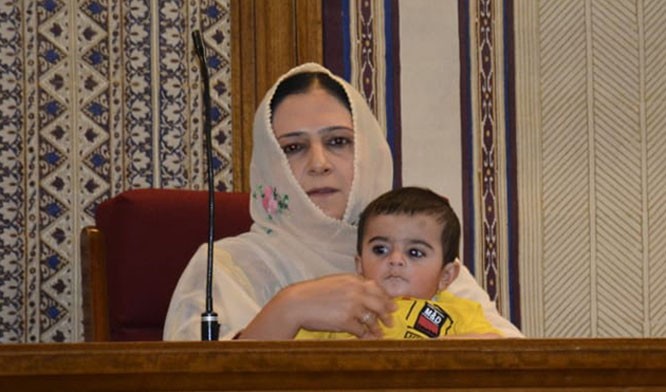
Every workingwoman, like Balochistan Assembly member Mahjabeen Sheraan, must get access to workplace crèches

This is painful. A woman legislator Mahjabeen Sheraan in the Balochistan Assembly was asked to leave the assembly session last month because she was carrying a baby with her. This is painful because deep down in my heart, I can relate with her. I can relate with her because this is the story of so many women of reproductive age who wish to carry their career forward alongside starting a family.
The choice is very hard. Either you leave your kids at the mercy of domestic help or relatives at home or choose to stay at home -- because you cannot bring your child to the workplace. You are educated. You are skilled. You have a dream to make a career and contribute to the family and society, and, yet, you are required to sacrifice it to start a family.
You make this decision because you want to keep your baby in front of your eyes to make sure that they are well fed and well rested in a protective environment. And this decision has a toll on you. Not only have you killed your dreams, you have also become economically dependent for life. You spent the most creative part of your life making the family and in the end, you become dependent on your husband (or father or brother) for your very basic needs to be fulfilled, giving him an upper hand to manipulate and control your life. For all the hard work you have done in making a good home, you are not entitled to any old-age benefit or social security. As an old woman you are dependent on others for your medicine, bread and clothing. And what if there is no one around to take care of you?
Women are pushed to the wall, excluded from the public sphere for the most important function i.e. childbirth and childcare. In the developed world, birth rate has already declined. In Korea and Japan, the ratio of old and young is alarming. According to 2014 estimates, 33.0 percent of the Japanese population is above the age of 60, 25.9 percent are aged 65 or above, and 12.5 percent are aged 75 or above. People aged 65 and older in Japan make up a quarter of its total population, estimated to reach a third by 2050. In Korea women prefer one child or no child at all even though they have better facilities of child-rearing and an accommodative environment at the offices compared to Pakistan. Germany had to conduct researches on why women avoid having babies and on the basis of the research findings, it was recommended that fathers need to get trainings in childcare to share the child-rearing burden with mothers.
Because women in these countries are reluctant to adopt their reproductive roles, their governments are forced to adopt measures that facilitate them in realising their dreams of personal and professional progress.
But in Pakistan no heed is paid to facilitate workingwomen. They are burdened with extra responsibilities and much of societal pressures as well as hindered by structural barriers. As a result they opt to stay at home and sacrifice their career and self-growth.
In a situation where women are increasingly getting education and skills to become economically independent or support their families, how and why must they stay at home and confine themselves to kitchen?
Provision of better working environment along with daycare facility can change the trend. The government should commit resources for better workplaces for women in the upcoming budget. In India, maternity leave has been raised up to six months. Why do we only prefer to race with our neighbours in getting arms and ammunitions? Why don’t we choose to race for better education, health and improvement of the status of women?